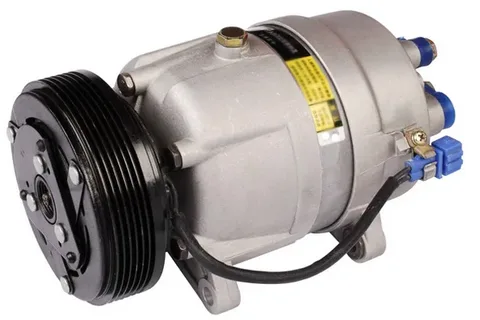A functioning car air conditioner is essential for a comfortable driving experience, especially during the warmer months. At the heart of this system is the air conditioner compressor, which plays a crucial role in ensuring the car aircon compressor operates efficiently. Understanding how to diagnose issues with the air conditioner compressor can help maintain the system’s performance and extend its lifespan.
What is a Car aircon- compressor?
The conditioning compressor is an essential component of the vehicle’s air conditioning system. It compresses the refrigerant, turning it from a gas into a high-pressure state, circulating through the system.
This allows the refrigerant to absorb heat and cool the air that is eventually blown into the car’s cabin. Without the compressor’s function of maintaining the refrigerant’s pressure and flow, the air conditioning system would be unable to provide the necessary cooling effect.
How Does a Car aircon- compressor Work?
The conditioner compressor draws in low-pressure refrigerant gas from the evaporator, compressing it into a high-temperature state. This high-pressure gas is then directed to the condenser, which cools and condenses it into a liquid.
The liquid refrigerant flows to the evaporator, absorbing heat from the car’s interior and converting it into a gas. This cycle continues, maintaining the cooling process that comforts the vehicle’s cabin.
Common Symptoms of a Car Ac Compressor Replacement
A failing car ac Compressor replacement often produces unusual sounds such as grinding or squealing. These noises can indicate internal component wear or damage, signalling that the compressor is struggling to perform its function. Paying attention to these sounds is crucial, as they often herald a more significant issue.
Reduced Cooling
If your car’s air conditioning system is not cooling efficiently, it may be a sign of a failing compressor. The compressor is responsible for maintaining pressure in the refrigerant system. When it cannot do this effectively, warm air will likely blow from the vents instead of the cool air you expect.
Leaks
Visible refrigerant or oil leaks around the compressor area are clear signs of failure. These leaks can occur due to wear and tear or damage to the compressor’s seals. If you observe any fluid pooling or dripping under your vehicle, it’s essential to have the system checked promptly to prevent further damage.
Clutch Issues
The compressor clutch plays a vital role in the operation of the air conditioning system. If the clutch fails to engage, the system cannot function properly, resulting in a lack of cooling. This issue often requires immediate attention to restore the system’s functionality.
Vibrations
Excessive vibrations during operation may indicate an internal malfunction within the compressor. If not addressed, these vibrations can cause further damage, affecting other components of the air conditioning system and potentially leading to costly repairs.
Electrical Problems
Faulty wiring or a blown fuse can prevent the compressor from operating, leading to a lack of cooling. Electrical issues are often overlooked, but they can significantly impact the overall performance of your vehicle’s air conditioning system. Regular checks of the electrical components help ensure that your AC system remains in good working order.
Diagnosing Car aircon- compressor Problems
Diagnosing issues with a car aircon- compressor involves a systematic approach. Begin by visually inspecting the compressor for apparent signs of damage, such as leaks or broken components. Listen for any unusual noises when the system is running.
Check the clutch to ensure it engages properly. A refrigerant pressure gauge can help determine if the system maintains the correct pressure levels. Electrical testing may also be necessary to diagnose issues related to the clutch or other electrical components.
Importance of Regular Maintenance
Regular maintenance of the car air conditioning (A/C) compressor is crucial for ensuring optimal performance and longevity of the vehicle’s cooling system. The compressor is the heart of the A/C system and is responsible for circulating refrigerant and maintaining the desired temperature inside the cabin. To keep the compressor functioning efficiently, routine checks that include monitoring refrigerant levels, inspecting for leaks, and examining the overall condition of the compressor and its associated components are essential.
Checking refrigerant levels is one of the first steps in A/C maintenance. Low refrigerant can indicate a leak, which, if left unaddressed, can lead to further complications and costly repairs. Inspecting the system for leaks, such as at the fittings or hoses, can help identify issues early on, preventing more severe problems.
Inspecting The Compressor
Additionally, it is vital to inspect the compressor and its components for signs of wear or malfunction. This includes checking for unusual noises, vibrations, or changes in performance. Addressing these warning signs promptly can prevent drivers from facing more significant issues that may require extensive repairs or even a complete compressor replacement.
By committing to regular maintenance and early intervention when problems arise, vehicle owners can significantly extend the lifespan of their A/C systems. This not only ensures a comfortable driving experience during the warmer months but also enhances the vehicle’s overall efficiency, contributing to better fuel economy and reliability.
Tools Needed for Diagnosing Car Ac Compressor Issues
A comprehensive toolkit is essential for diagnosing car ac Compressor issues. Required tools include spanners and screwdrivers for mechanical checks, a refrigerant pressure gauge to monitor pressure levels, an electronic leak detector to identify leaks, and a multimeter to assess electrical components.
The right tools can streamline the diagnostic process and accurately identify any problems within the air conditioning system. The right tools are essential for streamlining the diagnostic process and accurately identifying any issues within an air conditioning system. In a world where comfort relies heavily on efficient climate control, having the appropriate diagnostic equipment can make all the difference.
First and foremost, a manifold gauge set is indispensable. This tool allows technicians to measure the refrigerant pressure in the system, helping to determine whether the system is overcharged, undercharged, or operating within the manufacturer’s specifications. By analyzing these pressures, a technician can quickly identify potential issues, such as leaks or blockages.
Step-by-Step Guide to Inspecting the Compressor
Begin by examining the compressor for any visible signs of damage or wear. Look for cracks, leaks, or broken components that could hinder its performance. A thorough visual inspection helps identify any external issues before proceeding with more technical assessments.
Listen for Noises
Operate the air conditioning system and listen for unusual sounds, such as grinding or squealing. These noises can indicate internal issues within the compressor or other components. Unusual sounds may also suggest a lack of lubrication or potential failure, warranting further investigation.
Check Clutch Engagement
Observe if the compressor clutch engages when the air conditioning is activated. The clutch should engage smoothly without hesitation. If it fails to engage or disengages erratically, it may indicate electrical problems or wear in the clutch mechanism, affecting overall system performance.
Pressure Testing
Use a refrigerant pressure gauge to check if the system maintains proper pressure levels. This step is crucial in diagnosing problems such as overcharging, undercharging, or internal blockages. Maintaining appropriate pressure ensures efficient operation of the air conditioning system.
Inspect Electrical Connections
Verify that all wiring and connections are intact and functioning correctly. Damaged wires or loose connections can lead to performance issues and electrical failures. Ensure that all terminals are clean and corrosion-free to guarantee optimal electrical flow.
Test for Leaks
Employ an electronic leak detector to identify refrigerant leaks around the compressor. Refrigerant leaks decrease system efficiency and can lead to environmental concerns. Detecting and repairing leaks promptly is essential for maintaining system integrity and performance.
How to Test car Air Conditioning Compressor Performance?
Testing a car air conditioning compressor performance ensures optimal cooling efficiency and system reliability. To begin, confirming that the refrigerant levels are correct is essential.
An insufficient amount of refrigerant can hinder the compressor’s ability to effectively produce cool air. Once the refrigerant levels have been verified, the next step is to run the air conditioning system at maximum capacity. This is typically done by setting the temperature to the lowest setting and turning the fan to the highest speed.
While the system is running, use a digital thermometer to measure the temperature of the air coming from the vents. The manufacturer’s specifications for optimal performance, usually found in the vehicle’s service manual, should be compared to this temperature.
Properly Functioning System
Generally, a properly functioning system should produce air temperatures significantly lower than the outside ambient temperature, often 40 to 60 degrees Fahrenheit (4 to 16 degrees Celsius).
Any significant deviations from this expected temperature range could indicate potential issues with the air conditioning compressor or other system components. Possible problems may include a malfunctioning compressor, leaks in the refrigerant lines, or a clogged expansion valve.
If the air temperature is higher than expected, further investigation is necessary to identify the root cause of the issue. In some cases, professional assistance may be required to repair or replace faulty components, ensuring that the vehicle’s air conditioning system operates effectively and efficiently.
Understanding Compressor Replacement Options
When a air conditioning compressor fails, replacing it becomes necessary. New compressors offer reliability and longevity, whereas refurbished ones can be a more economical alternative. Ensuring the replacement is compatible with the vehicle’s air conditioning system is vital.
It is advisable to consult a professional mechanic to choose the right option and ensure proper installation, thereby maintaining the efficiency and functionality of the car’s air conditioning system.
Costs and Benefits of Repairing Of car air conditioner compressor
The decision to repair or replace a air conditioning compressor largely depends on the severity of the damage and the costs involved. If the problem is minor, such as a leak or worn-out part, repairing the compressor can be cost-effective. However, in cases of significant damage, such as internal failure or a seized compressor, repairs may not be sustainable in the long run. This is because the compressor could face recurring issues even after a repair, leading to higher maintenance costs over time.
On the other hand, replacing the car air conditioner compressor might involve a higher initial investment, but it usually offers a more reliable, long-term fix. New compressors often come with warranties, providing peace of mind and saving money on future repairs. Additionally, a new compressor will likely restore the air conditioning system’s performance to its optimal level, which can be crucial for vehicle comfort, especially in hot climates.
Ultimately, consulting a professional mechanic is crucial to making an informed decision. A skilled mechanic can assess the compressor’s condition and help determine whether repair or replacement is the better option based on factors like the extent of the damage, cost considerations, and the age of the vehicle.
Conclusion
Diagnosing and addressing car ac Compressor issues is vital for maintaining an efficient air conditioning system. Recognising symptoms and using systematic diagnostic methods can help identify problems early, potentially saving on costly repairs or replacements. Regular maintenance and timely interventions can prevent compressor failure, ensuring the air conditioning system remains reliable and effective and provides comfort during drives. Employing professional advice when needed ensures proper handling of any issues that arise.
FAQs
What Causes A Car aircon- compressor To Fail?
Common causes include lack of maintenance, refrigerant leaks, electrical issues, and normal wear and tear.
How Often Should A car ac Compressor Be Inspected?
Regular checks are advisable during routine vehicle servicing or if cooling performance diminishes of car ac Compressor.
Can A Car aircon- compressor Be Repaired?
Minor issues can often be repaired, but severe damage may necessitate replacement.




